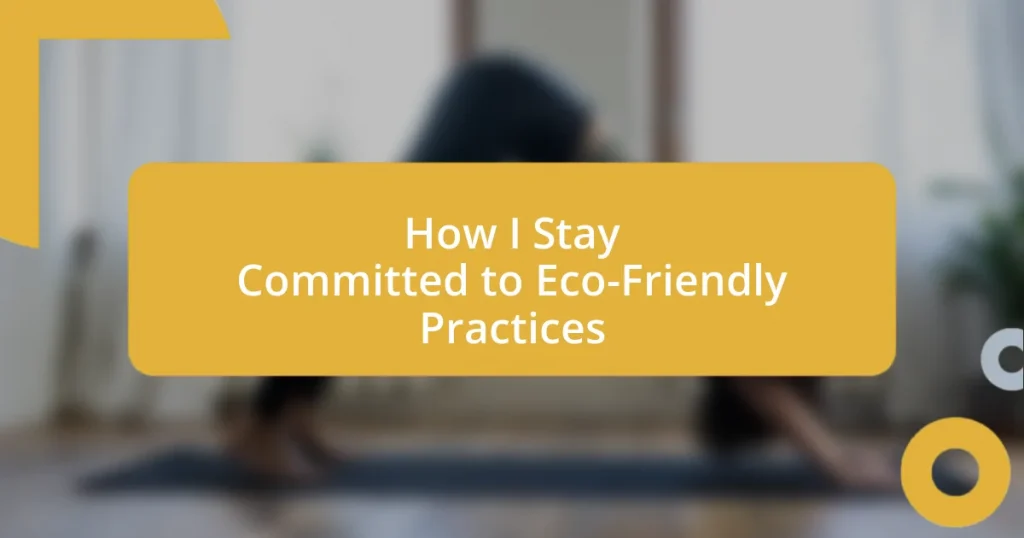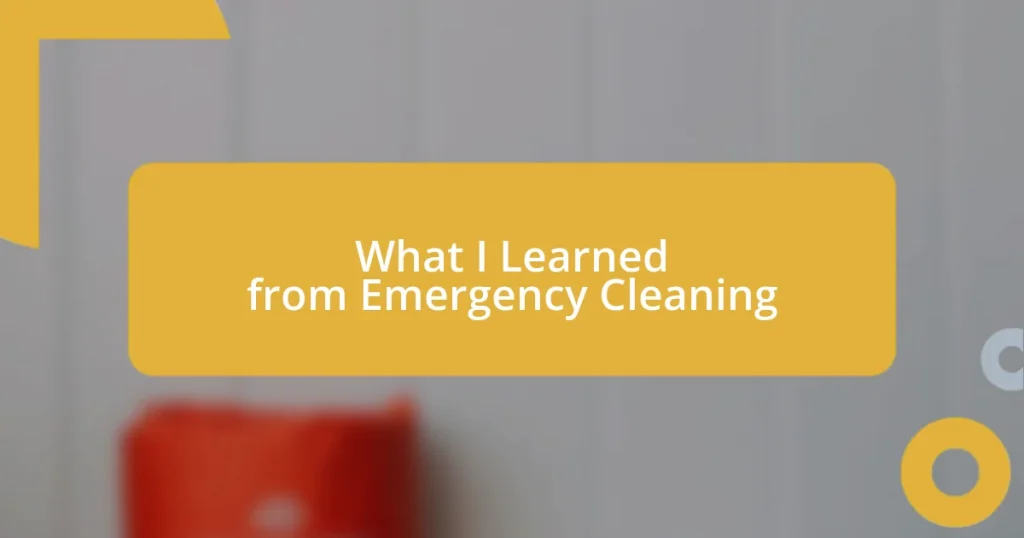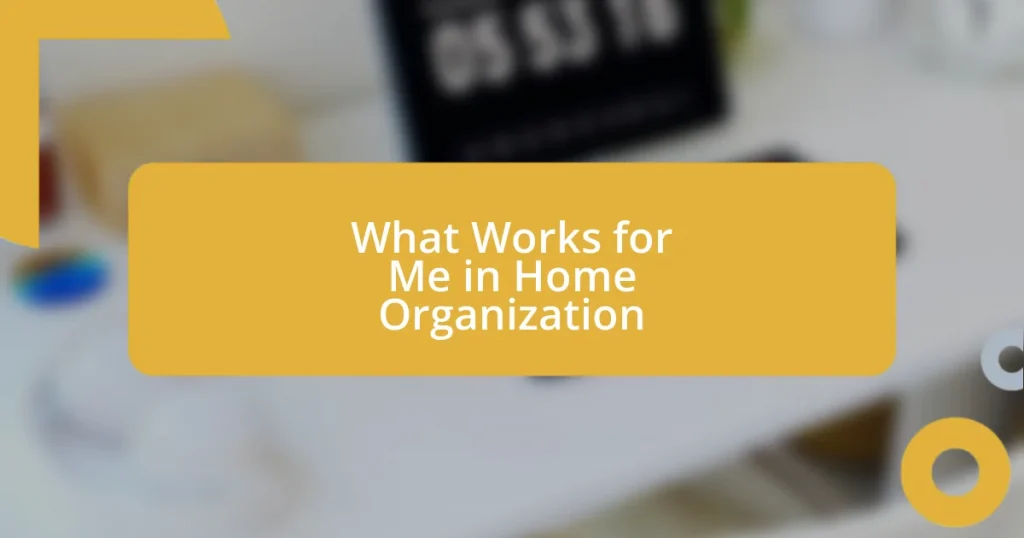Key takeaways:
- The author’s childhood connection to nature and experiences with climate change inspire their commitment to eco-friendly living.
- Daily habits such as meal planning, using public transportation, and mindful shopping play a crucial role in maintaining a sustainable lifestyle.
- Engaging with local sustainable brands and community initiatives fosters a sense of connection and reinforces a commitment to environmental practices.

My Motivation for Eco-Friendly Living
The motivation for my eco-friendly living stems from a deep connection to nature that was fostered in my childhood. I remember playing in my grandmother’s garden, surrounded by vibrant flowers and the hum of bees. That pure joy is a stark contrast to the anxiety I feel now when I see the effects of climate change. Isn’t it disheartening to think that future generations might not experience the same beauty I did?
I’ve also been deeply influenced by the stories of communities affected by pollution and climate disasters. When I volunteered in a coastal cleanup, the sheer amount of plastic waste was staggering. Seeing that firsthand made me wonder: what kind of legacy am I leaving behind? It compelled me to rethink my daily habits and fight for a healthier planet for everyone.
Every day, I find motivation in the little choices I make, whether it’s switching to reusable bags or choosing products with minimal packaging. There’s an undeniable sense of satisfaction that comes from knowing I’m contributing to a greater cause. Have you ever felt that thrill when your actions align with your values? For me, it’s a reminder that every small step counts in the journey toward sustainability.
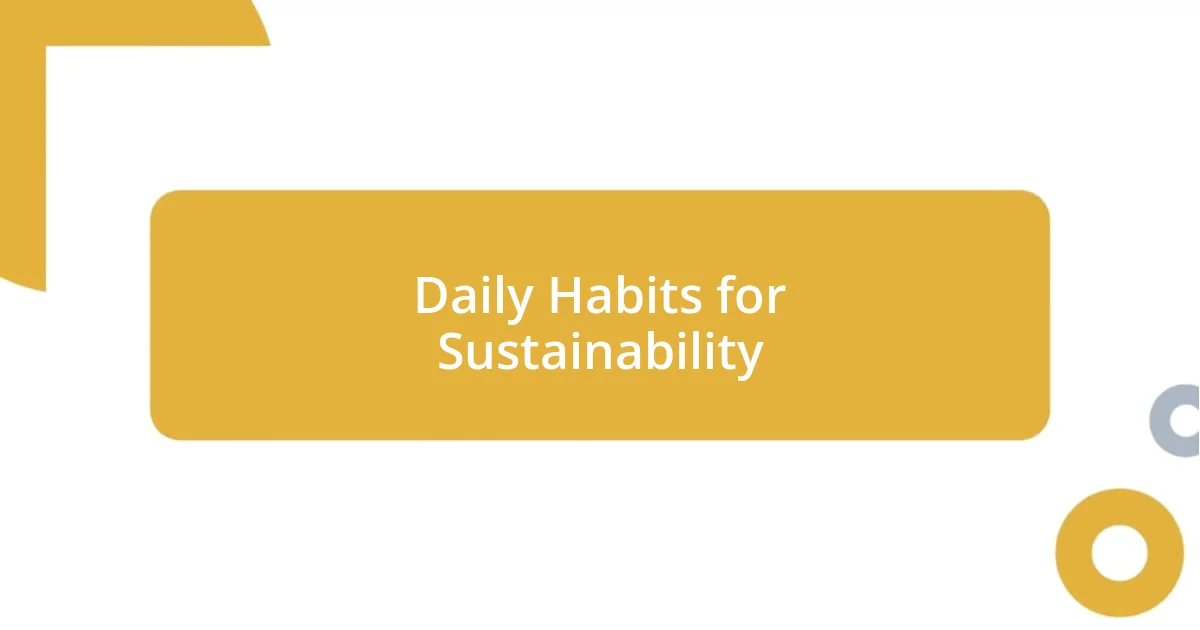
Daily Habits for Sustainability
I believe that daily habits are the backbone of a sustainable lifestyle. It’s amazing how small actions can add up over time. For me, starting my day with a reusable coffee cup has become a ritual. I remember the excitement of picking out a bright, stylish cup that reflects my personality. It’s not just about reducing waste; it’s a daily reminder of my commitment to minimizing my environmental footprint.
Here are some daily habits that help me stay committed to sustainability:
- Meal Planning: I take a little time each week to plan meals. This reduces food waste and saves money.
- Using Public Transportation: I ride my bike or take the bus whenever possible. Not only do I reduce my carbon emissions, but I also find joy in exploring my city in a new way.
- Mindful Shopping: I make a conscious effort to buy local and seasonal produce. This not only supports local farmers but also often means fresher, tastier food.
- Conserving Water: Simple things like turning off the tap while brushing my teeth or showering a little quicker have become second nature to me. It’s surprising how much of a difference it makes.
- Digital Decluttering: I regularly clean up my emails and files, reducing the energy consumption of data storage. It feels good to lighten the digital load!
These habits have transformed my daily routine, integrating sustainability into my life in ways I never imagined. Each small choice reinforces my values, and I can’t help but feel a sense of pride whenever I take these steps.

Choosing Eco-Friendly Products
Choosing eco-friendly products can feel overwhelming, but I like to break it down into manageable steps. When I shop, I often reflect on the materials used in the products. For instance, I remember the first time I switched to bamboo toothbrushes – a simple change that feels impactful. Have you ever considered how much plastic we toss away just by choosing the conventional ones? This realization made me look for alternatives that are both effective and kind to the planet.
I also read product labels with a critical eye. I seek out items that are biodegradable or made from recycled materials. I still recall a recent experience when I stumbled upon a brand that promised zero waste packaging. It felt like uncovering a hidden gem. I felt like I was contributing to a larger movement by choosing this brand over conventional ones. Isn’t it inspiring to think that our purchasing power can drive change?
Lastly, engaging with local brands has become part of my routine. I love visiting farmers’ markets and discovering artisans who prioritize eco-friendly practices. When I purchase handmade soaps or organic fruits, I not only support local economies but also develop a connection with the environment. This sense of community strengthens my commitment to sustainability, making me feel like I’m part of something bigger. Wouldn’t you agree that these interactions enrich our lives and align with our values?
| Eco-Friendly Product | Conventional Product |
|---|---|
| Bamboo Toothbrush | Plastic Toothbrush |
| Biodegradable Soap | Commercial Soap |
| Local Organic Fruits | Bulk Imported Produce |
| Reusable Grocery Bags | Single-Use Plastic Bags |

Reducing Waste in Everyday Life
Reducing waste in everyday life is more achievable than it seems. For example, I’ve started composting my kitchen scraps, and it’s been a game-changer. The first time I saw how much organic waste I was diverting from the landfill was eye-opening. Have you ever thought about how much good can come from a simple bin in your kitchen?
In addition to composting, I’ve embraced the art of repurposing. I’ve turned old glass jars into storage solutions – they make lovely spice containers too! It feels satisfying to give a second life to something that would have otherwise gone in the trash. It’s a creative process, and I often find myself thinking, “How can I use this item in a new way?”
Another strategy I’ve adopted is to buy in bulk. I visit a local store that offers a wide range of products without excessive packaging. There’s something thrilling about filling my reusable bags with grains, nuts, and even beauty products. I remember one day, while chatting with the store owner, I realized that each bulk purchase reduces packaging waste significantly. Isn’t that a rewarding feeling? Knowing that my choices directly impact reducing waste feels empowering, and I encourage you to explore bulk buying in your own routine!
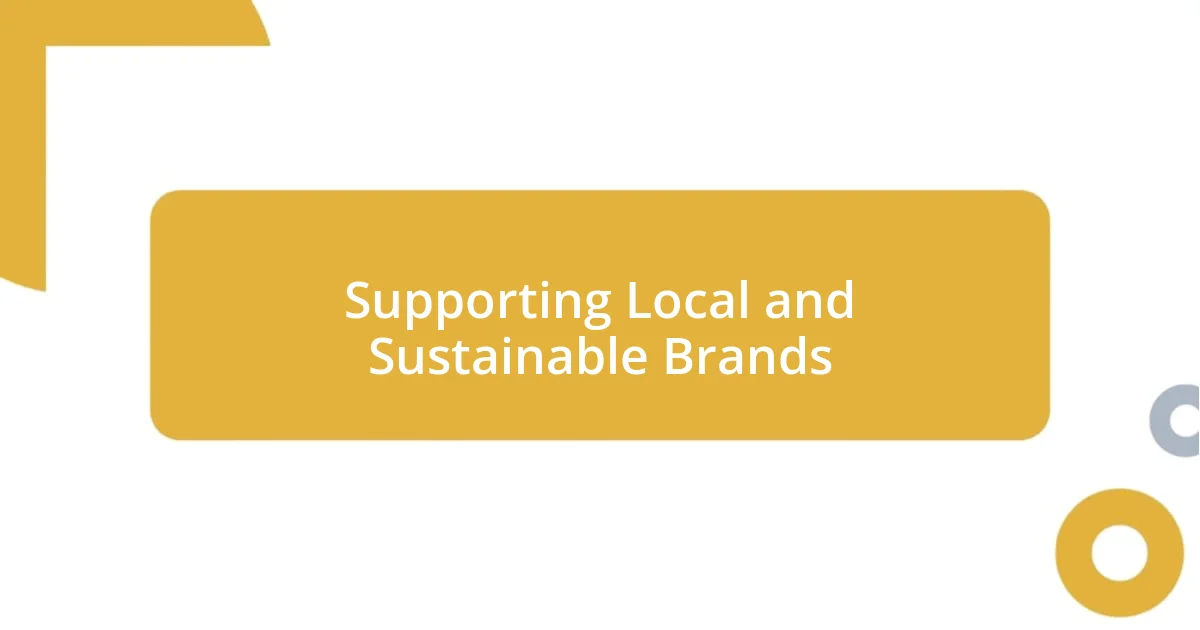
Supporting Local and Sustainable Brands
Supporting local and sustainable brands has truly transformed my shopping habits. I remember the first time I visited a small local shop that featured handmade products. The owner shared the story behind each item, creating a connection that made the purchase feel meaningful. Have you ever felt that rush of satisfaction when you know your money is directly supporting someone’s passion?
One of my favorite moments was when I discovered a local clothing brand that sources its materials from sustainable farms. Wearing their clothes, I felt a sense of pride, knowing I wasn’t just adding to my wardrobe but also supporting responsible practices. It’s incredible how these choices can add depth to our purchases, isn’t it? Each piece becomes more than just fabric; it’s a story of commitment to sustainability.
I also enjoy participating in local initiatives, like community events that promote eco-friendly brands. I vividly recall attending a pop-up market where I met creators who were as passionate about the environment as I am. Their energy was contagious! Engaging with vendors who genuinely care about their craft not only reinforces my support for sustainable practices but also inspires me to think critically about my own consumption. Would you consider attending similar events to discover unique sustainable products in your area?

Engaging in Community Initiatives
Participating in community initiatives has greatly enriched my eco-friendly journey. Recently, I joined a local cleanup event at a nearby park, and I was amazed at the sense of camaraderie among fellow attendees. It wasn’t just about picking up litter; it was about connecting with others who share a common mission. Have you ever felt that spark of community when working together toward a common goal?
One memorable day, I attended a workshop on sustainable gardening organized by a community group. Not only did I learn about native plants and their benefits, but I also made friends who are equally passionate about creating green spaces. Sharing tips and techniques felt like passing down a cherished tradition, and I couldn’t help but wonder—what if every neighborhood opened its garden for everyone to learn and grow together?
Additionally, volunteering at a local community garden has opened my eyes to the importance of local food production. I remember the first time I tasted a tomato I had helped to grow. It was more than just delicious; it was a tangible reminder of what community effort can achieve. Have you ever experienced the joy of nurturing something from seed to table? Engaging in such initiatives not only reduces our carbon footprint but also fosters a deeper appreciation for the environment and the people around us.
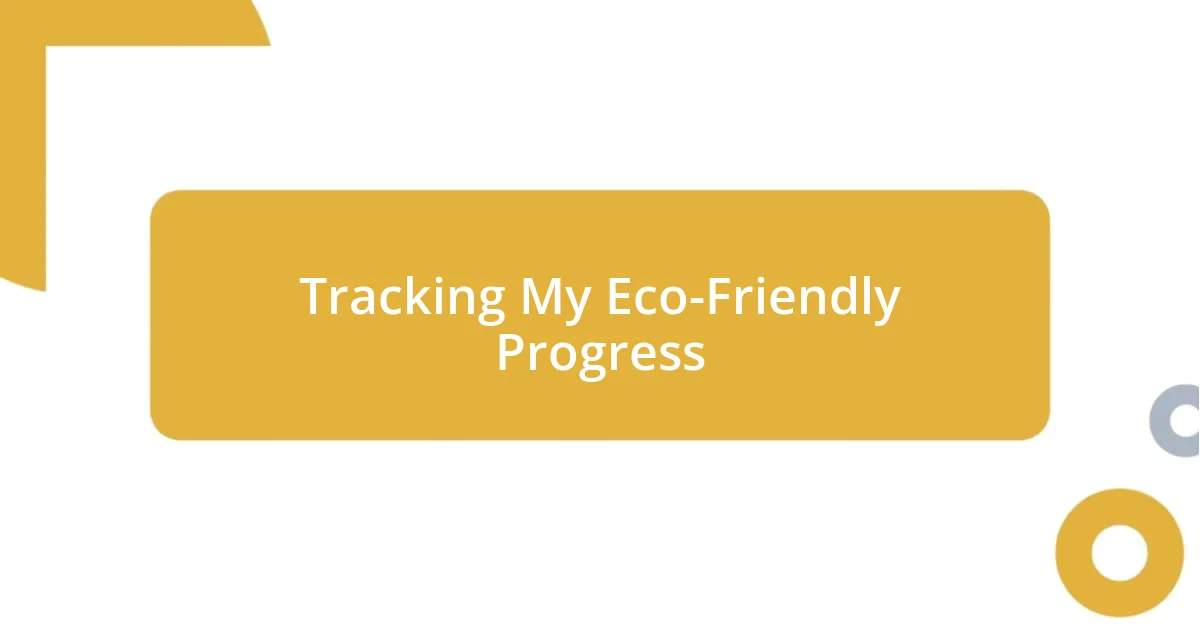
Tracking My Eco-Friendly Progress
Tracking my eco-friendly progress has become a rewarding aspect of my lifestyle. I use a simple app to log my actions, from reducing plastic use to tracking the miles I bike instead of driving. Each entry not only shows my achievements but also motivates me to push further—it’s like having a personal cheerleader for sustainability in my pocket! Have you thought about how tracking your efforts could inspire you to do even more?
One of my proudest moments was when I reached my goal of going plastic-free for a week. At first, it felt daunting, but by logging my daily choices and celebrating small wins, I realized how quickly I could adapt. I’ll never forget the sense of accomplishment I felt when I looked back at my week and saw how much I truly reduced my waste. Tracking this progress made each eco-friendly choice feel intentional and significant—doesn’t it feel good to visualize your steps forward?
I also keep a journal where I reflect on my experiences and challenges in adopting eco-friendly practices. After each month, I revisit my entries to assess what worked and what didn’t, which helps me make informed changes. One entry that stands out is when I realized I was consuming more water than necessary during my daily routines. Recognizing that habit prompted me to implement changes that have since transformed my water usage. Have you ever taken a moment to reflect on your habits for a deeper understanding of your eco-impact?










